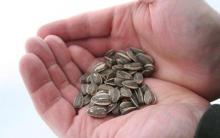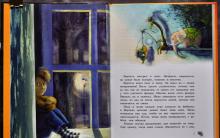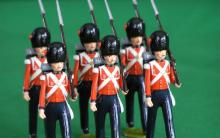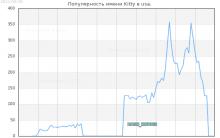The heroes of Turgenev's novels often became representatives of the new generation. This writer showed an amazing sensitivity to major social and political changes. However, this feature of Turgenev’s style even today does not deprive his book of its relevance. After all, history, as we know, repeats itself. And the conflict between fathers and children is relevant at all times.
Nihilist ideas
In April 1860, Turgenev once again left for France. In the small town of Soden, he studied the works of materialist philosophers. In the sixties, many young people showed interest in the natural sciences. Turgenev was offended by Dobrolyubov’s article, in which the author expressed extremely nihilistic views.
Young people are smarter than old people - this is the idea that was visible between the lines in the work young critic. A furious dispute developed in the correspondence between Dobrolyubov and Turgenev. Moreover, the discussion concerned primarily the basic categories of human existence - love and death.
The idea of the novel
There is no love, but there is physical attraction. There is no beauty of nature, but there is an eternal cycle of chemical processes. There is no spiritual pleasure in art, but only physiological irritation of the nerves. Young people immediately reject the ancient ideals of their fathers. Matter and force are the only things that cannot be doubted. But for some reason no one is mentally healthy man does not dream of death, and everyone strives to love and be loved. Such thoughts haunted the writer, and it was precisely from them that he was a novel is born, in which, like no other, the theme of the conflict between fathers and children is revealed.
From the history of creation
The writer thought a lot about the relationship between youth and old age. What is the connection between them? Turgenev analyzed the conflict between fathers and sons based on his own experience. Disputes similar to those depicted in the novel increasingly arose between him and his grown-up daughter Polina.
In 1866, Turgenev met with Herzen in London. The conversation between old friends was mainly about the Sovremennik magazine. And first of all, about the intolerant attitude of Chernyshevsky and Dobrolyubov towards the people of the forties. These conversations became the final impetus for the creation of a novel about the conflict between fathers and children. Turgenev touched on this topic in more early works, namely in " Noble nest" In "Fathers and Sons" he created an image that had not previously been found in literature.
New hero
In 1860, Turgenev began working on a new novel. During the first days, the image of a hero vaguely appeared in his thoughts, convinced that natural scientific discoveries could explain everything in man. The prose writer imagined a gloomy, significant, strong, evil figure, but at the same time pure and sincere. And doomed to death.
Turgenev created a character who stands on the threshold of the future, but is in constant confrontation with the present. At the same time, he turns out to be too weak to realize his ideas and bring them to life. The conflict between fathers and sons, humanists and nihilists, representatives of the Russian nobility and commoners - all this inspired the writer to create the novel.

Features of Turgenev's prose
This prose writer influenced both the form and content foreign literature. The opinion that he was addicted to European culture, incorrect. Rather, French prose writers of the 20th century wrote under the influence of Turgenev's work. The novel “Fathers and Sons” also became popular in Europe. The conflict of this work, however, can only be fully understood by those who grew up in Russia.
Turgenev's novels are characterized by the absence of verbose moralizing, which cannot be said about the books of Dostoevsky and Tolstoy. The author's voice in “Fathers and Sons”, “On the Eve”, “Ace”, “Spring Waters” does not occupy the first place. The writer never imposed his opinion on the reader. Another feature of Turgenev’s manner is the presence of subtext.
And finally, he always wrote about the most current problems contemporary society. Thus, in Turgenev’s novel “Fathers and Sons,” the conflict is born from contradictions that arose between adherents of different points of view. And it has a direct bearing on the social and political transformations in Russia in the mid-19th century.

Human nature is unchanged
Which political events took place during the years when Turgenev was working on his novel? The Decembrists were returned from Siberia. Reforms have begun. Liberal views are progressing in society. Turgenev quickly realized that everything that was happening was superficial. These are just conversations with nothing to follow. Turgenev, unlike Nekrasov, had no illusions.
The writer never relied on progress great hopes. He understood that human nature is unchangeable. The main character of the novel, Evgeny Bazarov, is a man completely free from liberal illusions. Empty conversations that Pavel Petrovich Kirsanov passionately conducts are alien to him. Bazarov doesn’t believe in anything, doesn’t want anything. This is a deeply disappointed man.

Image of Bazarov
The main character of this work is the first convincing commoner in Russian literature. This is the first character who proudly says about himself: “My grandfather dug the earth.” Turgenev wrote almost every novel for the sake of something new. literary image. “Fathers and Sons” was created for the sake of Bazarov. This character is a manifestation of a new type of consciousness.
In “Fathers and Sons” the writer created, as already mentioned, a fundamentally new hero. There is an opinion that Dostoevsky partially borrowed the image of Raskolnikov from his colleague.

What is Turgenev's novel about?
The political meaning of the novel “Fathers and Sons” somewhat obscures the main idea of the author, whose characteristic feature was humanity. This writer did not demand moral feats from his heroes. “Fathers and Sons” is a novel with a very deep human meaning, which is quite obvious, but it is overshadowed by the titanic figure of Yevgeny Bazarov.
The main character is straightforward, he is smarter than most of his interlocutors, therefore he is not interested in communicating with them. It's very difficult for him to live. Evgeniy loves his father, but cannot build a dialogue with him. He is attached to Arkady, but he annoys him. Bazarov completely lacks the ability to establish contact with others. The main character of Turgenev's novel denies everything, and above all conventions. He does not understand love metaphors and romantic relationship, and this becomes his main tragedy.
What main idea novel? Perhaps the fact is that happy is the one who knows how to forgive and love. The landscape depicted in final scene, illustrates main idea author: nature conquers everything. Let us remember the content of the book, namely its ending.

Two couples are getting married in the church: Nikolai Petrovich and Fenechka, Arkady and Katya. There is happiness in the lives of these characters, although it is somewhat feigned. Pavel Petrovich is still lonely, looks like a gentleman. But his life is empty. Sitnikov and Kukshina continue to put on a show, posing as representatives of new views.
The nihilist hero is the least fortunate. All that remains of his ideas is gravestone, where decrepit old people regularly come, cry and pray for the repose of their son’s soul. This fate awaits everyone. But Bazarov did not have time to truly fall in love or know his father’s happiness. Charged with the ideas of materialist philosophers, he was above this.
The ideal of a person according to Turgenev
The conflict of generations in “Fathers and Sons” is expressed in the form of dialogues. Throughout the entire story, the characters conduct endless discussions, trying to defend own point point of view, to prove to each other that they are right. Who wins this argument? Having finished reading Turgenev's novel, the reader does not see a resolution to the conflict. But one of the characters - a representative of the older generation - still wins the argument. Although he did not enter into controversy.
Pavel Petrovich does not inspire respect from the author. This is a man crushed feminine love. The writer does not mention the name of Kirsanov’s former lover. However, there is an opinion that Princess R is a symbol pointing to Russia. Pavel Petrovich Kirsanov is a man without a future, without prospects. Although this hero is only 44 years old. Main conflict in the novel it is expressed primarily in the dialogues of Pavel Petrovich and Bazarov. They are representatives of opposing views. As we know from the ending of the novel, there is no winner in their intellectual dispute.
The ideal person for Turgenev is by no means Bazarov. The most charming and sweet character in the novel is Nikolai Petrovich Kirsanov. He has a beloved son, a beloved woman. He reads poetry and plays the cello. Nikolai Petrovich knows how to live. And he is the most humane of all the heroes of Turgenev’s novel. He is one of the few who finds happiness at the conclusion of this whole story.

Russia's eternal problem
The author of the novel “Fathers and Sons” was not the first to write about the conflict of generations. Lermontov already spoke about this earlier. Moreover, the conflict between fathers and children (the main theme of Turgenev's novel) is a problem that has been relevant in Russia for a long time. Turgenev's compatriots were always alien to both English continuity and Eastern respect for the elderly.
In Russia, it is somehow not customary to support the ideas of ancestors. Perhaps this is where revolutionary events of varying scales, occurring from time to time over the past two centuries.
In the 18th century, an ideological movement called the “Enlightenment” spread across Europe. It was imbued with the spirit of struggle against all manifestations of feudalism. Enlightenment people put forward and defended the ideas of social progress, equality, and free development of the individual.
In Russia this historical period is marked by the appearance in the 19th century of “new people” - commoners - educated intellectuals who talk about the need to change life in the country. I.S. Turgenev noticed the beginning of the conflict in the disagreements between society and commoners. This prompted the writer to create the novel “Fathers and Sons,” in which the socio-political conflict between representatives of the nobility and commoners is the main one.
One of the representatives of commoners is main character novel Evgeny Vasilyevich Bazarov, who has amazing power will, solid character, deep intelligence, rare hard work. But at the same time, the shortcomings of the generation of “children” include a demonstrative indifference to art, aesthetics, music and poetry. Also, indifference to romance and love does not decorate the younger generation.
Bazarov personifies the generation of democrats. He accepts only what is useful, rejects principles and authorities. Continuous work for the benefit of society is the content of his life.
Pavel Petrovich represents the generation of liberal nobility. He claims that “...in our time only immoral or empty people”; acknowledges the old social order, not seeing any flaws in it, fearing its destruction.
The characters argue about poetry, art, philosophy. Bazarov amazes and irritates Kirsanov with his cold-blooded thoughts about the denial of personality and everything spiritual. Pavel Petrovich, on the contrary, admires nature and loves art.
The disputes between Bazarov and P.P. Kirsanov play a huge role in revealing the main contradictions of the eras. They have many directions and issues on which representatives of the younger and older generations do not agree.
Bazarov also has a conflict situation with Arkady Kirsanov. In “nihilism” he is attracted by opportunities that are usually valuable for a young person entering life - a sense of freedom, independence from traditions and authorities, the right to self-confidence and audacity. All this is combined with other properties of youth, far from “nihilistic” ideas and principles: Arkady is good-natured, ingenuously simple and attached to the poetry of traditional life, to the values of “his” culture. Therefore, Turgenev refers to his generation as “fathers,” since Kirsanov’s passion for the latest teaching is quite superficial.
Part of the conflict in the novel is the relationship between Bazarov and his parents. The scene of the arrival home is even more touching than the meeting between father and son Kirsanov. You can immediately notice the boundless love of the parents for Evgeniy. Here he is remembered as a man with all his weaknesses. For them, Bazarov is little Enyushenka. But the stern nihilist hides and masks his feelings towards his parents. First of all, in front of Arkady. After all, for him, the joy of meeting on the part of the Kirsanov parents was a sign of aristocratic softness. In turn, Vasily Ivanovich and Arina Vlasyevna are afraid to “scare off” their rarely visiting son, do not interfere with him, and do not talk about their feelings.
The conflict between the main characters of Turgenev's novel is the clearest example disputes between generations of the 60s of the XIX century. But the problem of “fathers and sons” is still relevant today. It is acutely relevant to people who belong to different generations. The generation of “fathers” tries to preserve everything that they believed in, what they lived with all their lives, sometimes not accepting the new beliefs of the young, strives to leave everything in their place, strives for peace. “Children” are more progressive, always on the move, they want to rebuild and change everything, they do not understand the passivity of their elders. The problem of “fathers and sons” arises in almost all forms of organization human life: in the family, in the work team, in society as a whole.
This problem can be solved if older generation will be more tolerant of to the younger generation, somewhere, perhaps, agreeing with him, and the generation of “children” will show more respect for their elders.
« Fathers and Sons" is a sharply polemical work. In it Turgenev reflected eternal problem“fathers and sons” and the most important issues of human existence related to it: the inevitability of generational change, comprehension of the experience of the past and reassessment of the life values of the outgoing generation, in other words, the collision of “the present century and the past century.”
But, besides this, the writer also reflected social conflict, the struggle of representatives of different social strata of society - nobles and commoners, different ideological positions of liberals and democrats.
In the novel by I. S. Turgenev, the characters of representatives of the 40s and 60s of the 19th century collide. The textbook conflict of the work is played out between Pavel Petrovich and Evgeny Bazarov.
Bazarov is a nihilist who denies everything that was accumulated before him by previous generations. Especially his heart “rebels” against everything immaterial: art, love, friendship, soul, finally. Bazarov considers all this to be inventions of aristocrats unsuited to business, fantasies weak people. The hero says this to Pavel Petrovich: “A decent chemist is twenty times more useful than any poet.” All these “newfangled trends” cause Kirsanov indignation and anger. He considers himself and his class to be carriers true values, almost the saviors of humanity.
Disputes and quarrels immediately begin to break out between these heroes. There wasn't one important issue, on which there would be no fundamental disagreements between them. Disputes were conducted on a variety of issues: political, scientific, moral.
However, Pavel Petrovich turns out to be an untenable opponent for Bazarov. All Kirsanov’s words are just “words”, since they are not supported by any action. He doesn't have his own beliefs. Pavel Petrovich both externally and internally resembles a doll. Bazarov, a fast-moving, active man, is disgusted by everything that Kirsanov “consists” of.
At the end of the novel, we learn that Kirsanov moved to Germany and that the Germans themselves mistake him for an Englishman. And all that remained of his love for Russia, which Kirsanov loved to talk about so much, was an ashtray in the shape of a peasant’s bast shoe on his desk.
Arkady's conflict with his father is not as obvious as the eternal clashes between Bazarov and Kirsanov, but it is very painful. The image of Nikolai Petrovich Kirsanov itself was created by the author with great sympathy. This is a man with tender soul, fairly educated, loving and appreciating art. He is simple and wise. Arkady is in many ways similar to his father. But his passion for nihilism makes him move away from Nikolai Petrovich. This distance is largely feigned. Arkady really wants to seem like an adult, mature person with his own views on the world around him. To a young man I really want to be like my idol Bazarov in everything. But the gap between Arkady and Evgeny is huge. In fact, the younger Kirsanov needs very little to be happy: to live in home together with father, have loving wife, raise children. That is why Nikolai Petrovich is so offended by his son’s feigned cynicism, his careless attitude towards eternal ideals.
Kirsanov is very worried about Arkady's alienation, but he is wise enough not to blame his son. And indeed, after some time, Arkady again returns to simple human happiness, everyday harmony, which he really needed.
The most difficult conflict, in my opinion, is the gap between Bazarov and his parents. Evgeniy's feelings for his father and mother are contradictory. In a fit of frankness, he admits that he loves his parents. But his words very often show contempt for the “stupid life of our fathers.” The fact is that this contempt is not feigned, like Arkady’s, but real. Evgeniy's father and mother love him madly. They try not to irritate their son in any way, they try to please him in everything, but in vain.
The ending of Bazarov's life shows that his life philosophy was also erroneous. Bazarov dies because... According to Turgenev, nihilism has no future; it is impossible only to destroy without creating anything.
The very title of the work suggests that it will resolve the eternal question - the relationship between generations. To some extent this is fair. But the author’s main attention is drawn to the conflict of different worldviews - liberals and revolutionary democrats, called nihilists. Turgenev created the image of a new man, a commoner by birth, a democrat by political views. The contrast between the views of commoners and nobles, democrats and liberals is the basis of the novel’s conflict.
Among the heroes of the novel, the most active representatives of irreconcilable worldviews are Evgeny Bazarov and “aristocrat to the core” Pavel Kirsanov. Pavel Petrovich was a typical representative of his era and environment. He followed the “principles” everywhere and in everything, even continuing to live in the village as before. He kept his habits unchanged, although from a practical point of view it was inconvenient. But for the nihilist Bazarov it looked simply ridiculous.
Pavel Petrovich is about forty-five years old, he is always shaven, wears a strict English suit, the collar of his shirt is always white and starched. “The whole appearance of Pavel Petrovich, elegant and thoroughbred, retained youthful harmony and that desire upward, away from the earth, which for the most part disappears after the twenties.” In appearance and by conviction, Pavel Petrovich is an aristocrat. True, as Pi-sarev notes, “he... has no convictions, but he has habits that he values very much,” and he “out of habit proves in disputes the need for “principles.” What are these “principles”? First of all, this is a view of the state structure. A nobleman and aristocrat himself, he holds the same views as most nobles of that time. Pavel Petrovich is for the established order, he is a monarchist.
Pavel Petrovich cannot tolerate dissent and fiercely defends doctrines that “his actions constantly contradicted.” He loves to talk about Russian peasants, but when he meets them, he “wrinkles and sniffs cologne.” Kirsanov talks about Russia, about the “Russian idea,” but at the same time uses great amount foreign words. He speaks with pathos about the public good, about serving the fatherland, but he himself sits with folded hands, satisfied with a well-fed and calm life.
But, seeing that he cannot defeat the nihilist in a dispute, cannot shake his moral foundations, or rather, the lack of them, Pavel Petrovich resorts to the last resort of resolving conflicts of this kind. This is a duel. Evgeniy accepts the challenge, although he considers this the trick of a crazy “aristocrat”. They shoot, and Evgeniy wounds Kirsanov. The duel did not help solve their problems. With the help of a partly satirical depiction of these events, the author emphasized the absurdity of Pavel Petrovich’s behavior, because it is ridiculous and even senseless to believe that you can force the younger generation to think the same way as the generation of “fathers”. They part, but each of them remains unconvinced. Bazarov only managed to upset Pavel Petrovich’s mental balance,
For young people, nihilism is a certain political and life position. Many perceive it as a fashionable fad (Sitnikov, Kukshina, Arkady). Deny everything: authorities, science, art, the experience of previous generations and not listen to anything - that’s their motto. But sooner or later they will all grow up, start families and remember their beliefs as the mistakes of their youth. And now they are only vulgarizing the ideas that Bazarov preaches.
However, the main character is aware of his thoughts and is firm in his convictions. He is interested natural sciences and intends to continue the work of his father, a retired doctor, who does not give up practicing medicine even in the wilderness of the village.
Evgeny scoffs at Pavel Petrovich’s “principles”, considering them unnecessary and simply frivolous. Bazarov finds that it is better to deny, and he denies. To Pavel Petrovich’s exclamation: “But we need to build!”, he replies: “This is no longer our business.” Evgeniy speaks sarcastically about romantics, but, having met love, he realizes the romance in himself. Life treated Bazarov cruelly. Not believing in love, he fell in love, but his love was rejected.
Looking at the album of Saxon Switzerland, Bazarov says to Odintsova: “You don’t assume in me artistic meaning“Yes, I really don’t have it in me, but these species could interest me from a geological point of view.” Bazarov tries to debunk ineffective “principles” and does not accept illusory dreaminess. But at the same time, he rejects the great achievements of culture (“Raphael is not worth a penny”) and perceives nature in a utilitarian way.
Bazarov dies with the words: “Russia needs me... No, apparently he doesn’t need me. And who needs a wife?” This is the tragic result of the life of Eugene.
The author's attitude towards his characters is not at all simple. The writer himself belongs to the generation raised in German universities, he is a nobleman and a liberal. But he remarkably managed to show the change in forms of consciousness, as well as the inevitable tragedy of people who are the first to take a step forward towards a new world order.
In the novel “Fathers and Sons” by Ivan Sergeevich Turgenev, it is written about the conflict of different generations.
The main character Evgeny Bazarov is a very hardworking person. He likes exact sciences, he conducts research and experiments. Bazarov tries in every possible way to benefit his homeland and society as a whole. He doesn't like to talk about feelings and denies any expression of them. For him, creativity and poetry have absolutely no meaning.
Pavel Petrovich Kirsanov becomes his opponent - it is he who enters into an argument with Bazarov. Kirsanov Sr. does not understand why the young man Evgeniy treats art with such disdain.
Every day these two treat each other more and more with hatred and anger. It comes to the point that they start a secret duel in which Bazarov wins. Evgeniy’s victory is just a lucky chance and it could also have turned up against Pavel Petrovich.
After the duel, passions in the Kirsanovs' house, where Bazarov was invited, subsided a little. However better friend They did not treat each other.
Arkady, who will invite his friend to stay in his parental home, also notices that Bazarov is not so good man and in fact they don't have as much in common as he previously thought. Arkady and Evgeny considered themselves to be members of the nihilistic society.
The Kirsanovs are wealthy nobles, they have their own estate, a little dilapidated, but large. Kirsanov Sr. a good education and he is a very intelligent and well-mannered person. Arkady Kirsanov was receiving his education and met Evgeny Bazarov. It was Bazarov who led Arkady to the nihilists. Evgeniy has very few friends, or rather, practically none. All his friends and acquaintances at first eagerly accepted his ideas of nihilism, but then everyone quickly dispersed. Everyone went their separate ways, some got married and took care of their families, and some found things more interesting.
Arkady was very sympathetic to Bazarov and tried to support him in everything. Over time, Kirsanov realizes that it is better for them to stop communicating with Bazarov. Kirsanov has loving family father and uncle. A little time will pass and Arkady will marry a wonderful girl, Katerina, whom he fell in love with very much. Kirsanov believes that he should put his family at the head and abandon Bazarov’s obsessions.
Evgeny Bazarov has none of this. His parents, of course, love him madly, but they cannot show their feelings fully so as not to frighten their son. Evgeniy does not love anyone and believes that all people are no match for him. In order to satisfy his physiological needs, he does not need to love anyone. It is enough for the girl to be pretty. The only person he considered his equal was Anna Sergeevna Odintsova’s girl. Bazarov fell in love for the first time and wanted to own this woman. Anna Sergeevna refused him.
Bazarov will die trying to prove to everyone that he is right and that the manifestation of feelings is complete nonsense. He did not want to choose a family home and a loving family. I couldn’t even convey my knowledge of nihilism to Bazarov. Evgeny Bazarov died alone.
Several interesting essays
- Characteristics and image of Pyotr Grinev from the story The Captain's Daughter by Pushkin, essay 8th grade
Petr Grinev is the main and positive hero story " Captain's daughter" He is a young nobleman from a wealthy family. All day long the boy chased pigeons and played with the yard boys.
- Prisypkin in the play Bedbug by Mayakovsky essay
In Mayakovsky’s work “The Bedbug” we get acquainted with a wonderful enchanting comedy story written by the author in a communist way. It contains many interesting images for analysis.
- Analysis of Gogol's comedy The Inspector General
Gogol chose the life of an official in Russia as the subject for the story in the comedy “The Inspector General.” The writer in every possible way subjects the morals inherent in this life to satire.
- Essay Fairytale image of the Swan Princess by Pushkin
All works of Pushkin are brilliant and are considered highest degree human culture and education. This includes “The Tale of Tsar Saltan.” Fairy tale in verses that good triumphs over evil.
A feat is an action heroic deed, performing which a person shows all his best qualities: heroism, courage, ability to self-sacrifice.











The benefits of sunflower seeds for the heart, hair and nerves
Why do my legs give way at the knees?
Name energy: how the patronymic influences fate and the birth program Name patronymic meaning character
First Chinese Emperor
Alfred the Great: biography